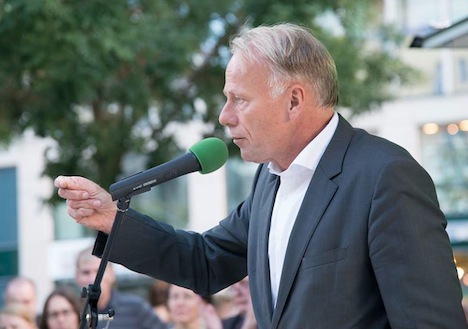The final weeks of the German election campaign have been marked by something less than substantive debate, what with the largest turn of events being center-left chancellor candidate Peer Steinbrück posing on the cover of a top news magazine giving German voters the bird.![]()
But with just six days to go until voting to determine the membership of the German Bundestag, the lower (and most important) house of its parliament, all eyes are on Jürgen Trittin and Die Grünen (the Greens) after a sensational story has put Trittin, a longtime Green leader, very much on the defensive.
The scandal involves a Green Party pamphlet from Göttingen in 1981 — just two years after the Greens formed as a political party — that Trittin approved and which called for the legalization of sex between minors and adults. Trittin was a student at the time, one of five members of an editorial board that approved the manifesto, and claims not to have known the extent of the pamphlet.
Trittin, who served as the environmental minister in center-left chancellor Gerhard Schröder’s government between 1998 and 2005, today accepted full responsibility for the pamphlet and apologized for any minor role he played, which he claimed incorporated the stance of a radical gay rights group.
No one disputes the substantive content of the actual allegation, but it’s hard not to see the kerfuffle as a dirty trick against the Greens — family minister Kristina Schröder was quick to demand Trittin’s resignation, and other members of the center-right Christlich Demokratische Union Deutschlands (CDU, Christian Democratic Party) were also quick to attack Trittin and the Greens. Alexander Dobrindt, the secretary-general of the CDU’s sister party in Bavaria, the Christlich-Soziale Union in Bayern (CSU, the Christian Social Union), called Trittin a front man for a ‘pedophilia cartel.’
Dobrindt himself is no stranger to controversy after calling on Greece to leave the eurozone last year during the heart of the eurozone’s financial crisis, and his CSU is the main force preventing the legislative adoption of marriage equality in Germany.
The CDU/CSU’s sanctimonious tone against Trittin is akin to demanding that Merkel to resign because of her now documented, minor involvement with the communist Sozialistische Einheitspartei Deutschlands (SED, Socialist Unity Party) as a young scientist in East Germany. Even though Merkel had ties in her student days to the SED, so did most prominent East Germans, due to the nature of living in an authoritarian dictatorship in the 1970s and 1980s. No one credibly believes that any minor collaboration should outweigh the role she played as a democratic activist in the late 1980s or doubt her legitimacy over two decades as a top policymaker in the reunified Germany.
But the Greens, which got their start as a radical leftist group and emerged from the new political movements of the 1970s, including the environmental movement, the pacifist movement and the sexual revolution, formally endorsed Germany’s anti-pedophilia laws in 1989. The Green Party has been hit with charges of supporting pedophilia in the past, and it was Franz Walter, a political scientist investigation the party’s past affiliations with pedophile activists, who discovered to link to Trittin.
It’s also not difficult to understand why the CDU/CSU is brimming with such stern disapproval — the profile of the Green Party’s electorate has become older and wealthier over the past decade. So if the latest scandal causes Green voters to think twice about their support (especially soft Green supporters), many of them will consider voting for the CDU or the CDU’s liberal junior coalition partner, the Freie Demokratische Partei (FDP, Free Democratic Party) instead of the center-left Sozialdemokratische Partei Deutschlands (SPD, Social Democratic Party). That’s important — while the CDU/CSU leads the SPD by between 12 and 16 points in most opinion polls, the FDP is winning around 5% in polls, which is the threshold for winning seats in the Bundestag on the basis of proportional representation.
So in a world where the Green vote collapses, it would be much better for Merkel if the SPD gains a few more votes, so long as the FDP gains a few more votes (at least enough to win 5% of the electorate).
Given the state of the campaign, the Greens have already been doing a pretty good job of confirming their own irrelevance. If it’s been a horrible campaign season for the SPD and the FDP, it’s not been an easy one for the Greens. Polls show the Greens winning between 9% and 11% of the vote, and markedly less than the 20% to 25% that polls showed the Greens winning in much of 2011 — after the Fukushima nuclear meltdown in Japan but before Merkel announced her support for phasing out Germany’s nuclear energy. Continue reading Top German Green Party leader tagged with sensational sexual politics kerfuffle

